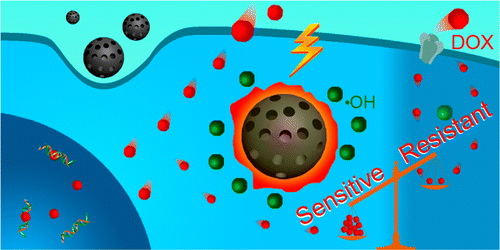The development of chemotherapeutic resistance and subsequent treatment failures are serious obstacles in cancer therapy. Under evolutionary pressure from chemotherapy, some cancer cells mutate resistance-related genes in order not be killed by drugs, but become insensitive and resistant to them. Once resistance develops, higher doses of available drugs may be ineffective, resulting in strong toxic side effects. Until now, efficient approaches to overcome resistance still lack in clinic. Resistant cells exhibit some characteristics including the mutation of resistance-related genes and over-expression of drug-export proteins in the cell membrane, which are closely associated to a lower redox state compared to non-resistant cells. An attractive option for combatting resistance is producing a high concentration of produced free radicals in situ. Recently, the scientists in Prof. Chunying Chen’s team have designed new catalysis-based strategy to successfully overcome chemoresistance. They designed and prepared a sp2 and sp3 carbon-based nanocarrier, hollow carbon nanosphere as a novel platform for delivering a drug doxorubicine (DOX) and generating additional cellular reactive oxygen species using near-infrared laser irradiation. These irradiated HCSs catalyzed sufficiently persistent free radicals to produce a large number of heat shock factor-1 protein homotrimers, thereby suppressing the activation and function of resistance-related genes. Laser irradiation also promoted the release of DOX from lysosomal nanocarriers into the cytoplasm so that it could enter cell nuclei. As a result, DOX@HCSs reduced the resistance of human breast cancer cells to DOX through the synergy among photothermal effects, increased generation of free radicals, and chemotherapy with the aid of laser irradiation. HCSs can provide a unique and versatile platform for combatting chemotherapy resistant cancer cells. This strategy could reduce or eliminate treatment resistance, and increase the likelihood of long-term treatment success. The research has recently been published in J. Am. Chem. Soc. 2015, 137(5): 1947-1955. This work was collaborated with two other teams from Dalian University of Technology and Food and Drug Administration (FDA).The first author Dr. Liming Wang comes from Key Laboratory for Biomedical Effects of Nanomaterials and Nanosafety of Chinese Academy of Sciences. It was financially supported by the National Basic Research Program of China, the National Natural Science Foundation of China, the Chinese Academy of Sciences, and the FDA Nanotechnology CORES Program.  Laser irradiation stimuli to hollow carbon nanospheres can produce heat and free radicals that combat chemoresistance by increasing drug accumulation inside resistant cells and improving their sensitivity to drugs. |

